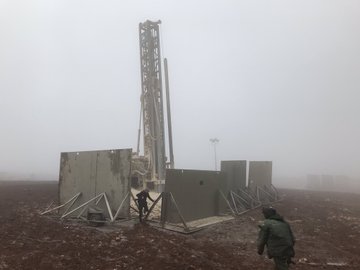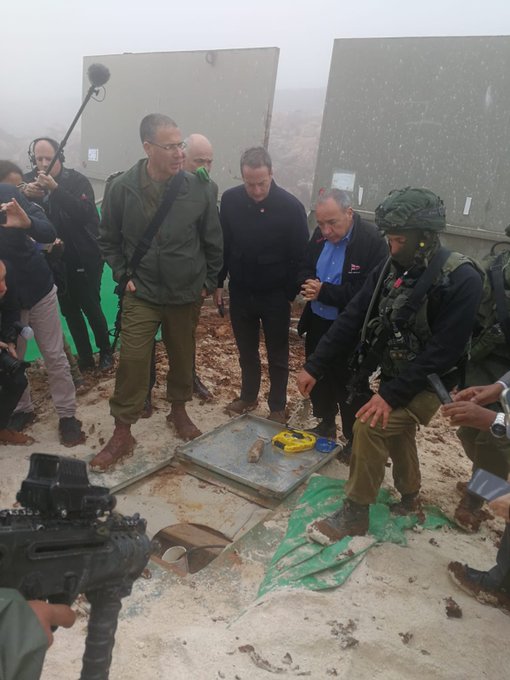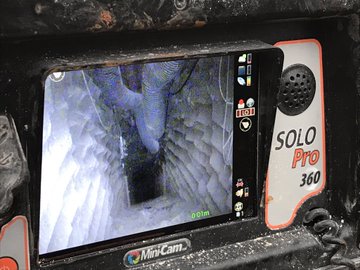Israel Katz’s statement comes on the heels of PM’s warning that Hezbollah seeks to send ‘entire battalions’ into Jewish state.
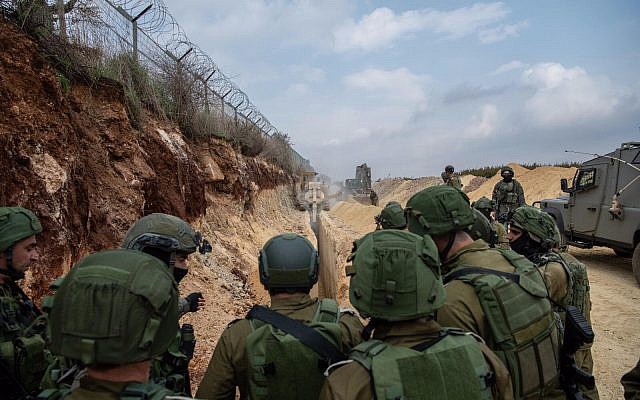
IDF Chief of Staff Gadi Eisenkot, center, visits soldiers searching for Hezbollah attack tunnels on Israeli-Lebanese border on December 4, 2018. (Israel Defense Forces)
A senior Israeli minister said Friday that Israeli forces may need to go into Lebanon to deal with the newly revealed Hezbollah attack tunnels that snake under the border.
“If we think that in order to thwart the tunnels that one needs to operate on the other side, then we will operate on the other side of the border,” Israel Katz, who holds the intelligence and transport ministries told Radio Tel Aviv, according to Reuters.
Katz was reiterating a warning made Thursday by an unnamed senior Israeli official. So far, IDF forces have been working to find and destroy the tunnels from the Israeli side of the frontier only.
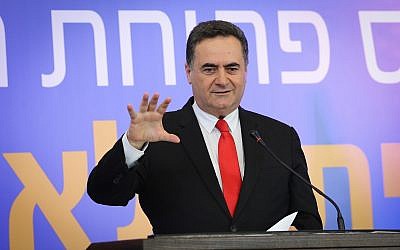
Intelligence and Transportation Minister Israel Katz speaks during the inauguration ceremony for the new train station in the southern Israeli town of Kiryat Malachi, on September 17, 2018. (Flash90)An IDF incursion into Lebanon would likely spark a major confrontation with Hezbollah.
On Thursday, Prime Minister Benjamin Netanyahu warned that Hezbollah seeks to send “entire battalions” into Israel, including via the tunnels Israel is now tackling, in order to seize land, and kidnap and kill Israelis.
Netanyahu warned that Hezbollah seeks to infiltrate “several battalions” into Israel — to seize territory, “murder and kidnap.” Hezbollah’s tunnels are “broader” than those of the Gaza-based Hamas terror group, the prime minister said.
“If you look at the Hamas tunnels, they’re very narrow, basically for one person. The Hezbollah tunnels are broad. They enable several people to come at one and also to put motorcycles, I’m pretty sure tractors and so on,” Netanyahu told a group foreign envoys as they toured the area.
This, he elaborated, was “in order to bring in many forces, simultaneously, which means several battalions into our territory, with the purpose of cutting off communities here, towns, kibbutzim, and then going into a campaign of murder and kidnapping, which could happen simultaneously.
”The senior officer who briefed reporters echoed this assessment. The cross-border tunnels “are wider and larger, and their goal is to transfer entire battalions, large forces, into Israeli territory, in order to come in and carry out killing sprees and kidnappings and to capture Israeli towns and villages,” this officer said.
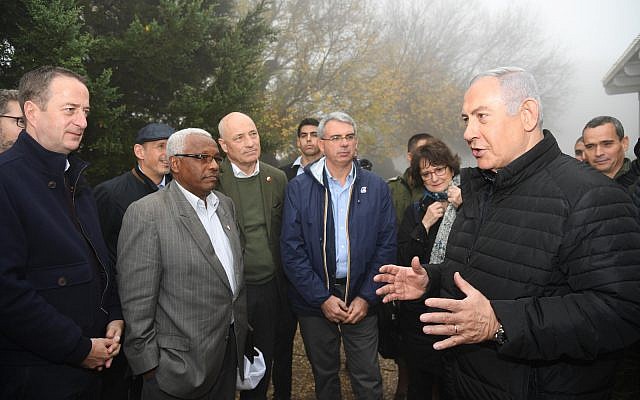
Operation Northern Shield was launched earlier this week due to the fear that the details of the operation would be leaked and revealed to Hezbollah, the senior officer said.
“If Hezbollah knew that we knew [about the existence of the tunnels] then this would accelerate their kidnapping efforts, and we did not want to get to a situation where the kidnappers infiltrate into Israel and abduct a soldier or a civilian, and no one would know anything about it,” the senior official added.
The decision to embark on the operation was taken on November 7, and was one of the reasons why the cabinet decided not to launch a major military campaign against Hamas in Gaza, the official added. “There were other reasons, too, but that was one of them,” he said.
Netanyahu urged the foreign diplomats to condemn and sanction the Shiite terror group for its aggressive actions.
“Israel expects an unequivocal condemnation of Hezbollah, the imposition of additional sanctions on Iran, a condemnation from the Lebanese government and a demand that it stop giving its approval for the use of its territory for these attacks against Israel,” he told the group of senior ambassadors from across the globe.
“All of this will come up at the upcoming meeting of the UN Security Council which Israel has demanded. This is an important political and diplomatic step that complements our operational and engineering effort to deny Hezbollah and Iran the tunnels weapon.”
“We are systematically and decisively denying our enemies the tunnels weapon. We are doing this with Hamas, and with Hezbollah; we will do whatever is necessary,” he added.
“Anyone who attacks us — is taking his life into his hands,” he added. “Hezbollah knows this and Hamas knows that too.”
Operation Northern Shield has just begun, but at the end of it, “the tunnels weapon, in which Hezbollah has invested so much, will not exist and will not be effective.”
Netanyahu also told the ambassadors that while Hezbollah chief Hassan Nasrallah is seeking a huge arsenal of precision-guided missiles, and wanted to have thousands by now, at present he only has a few dozen highly accurate missiles in the Hezbollah arsenal, which is estimated at 100,000-plus rockets and missiles.
More than a dozen ambassadors participated in the briefing on a foggy Thursday morning, including those from the European Union, France, the UK, Russia, Hungary and Poland.
“The purpose of the ambassadors’ briefing was to receive support and legitimacy for additional actions, if they will become necessary,” the senior Israeli official said.
[Disclaimer]




